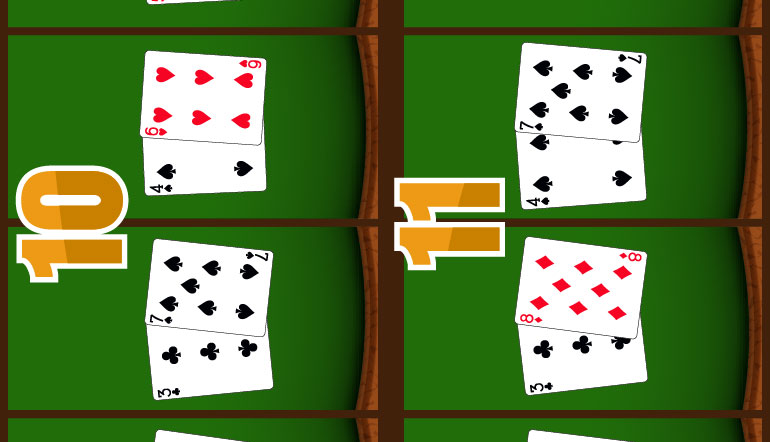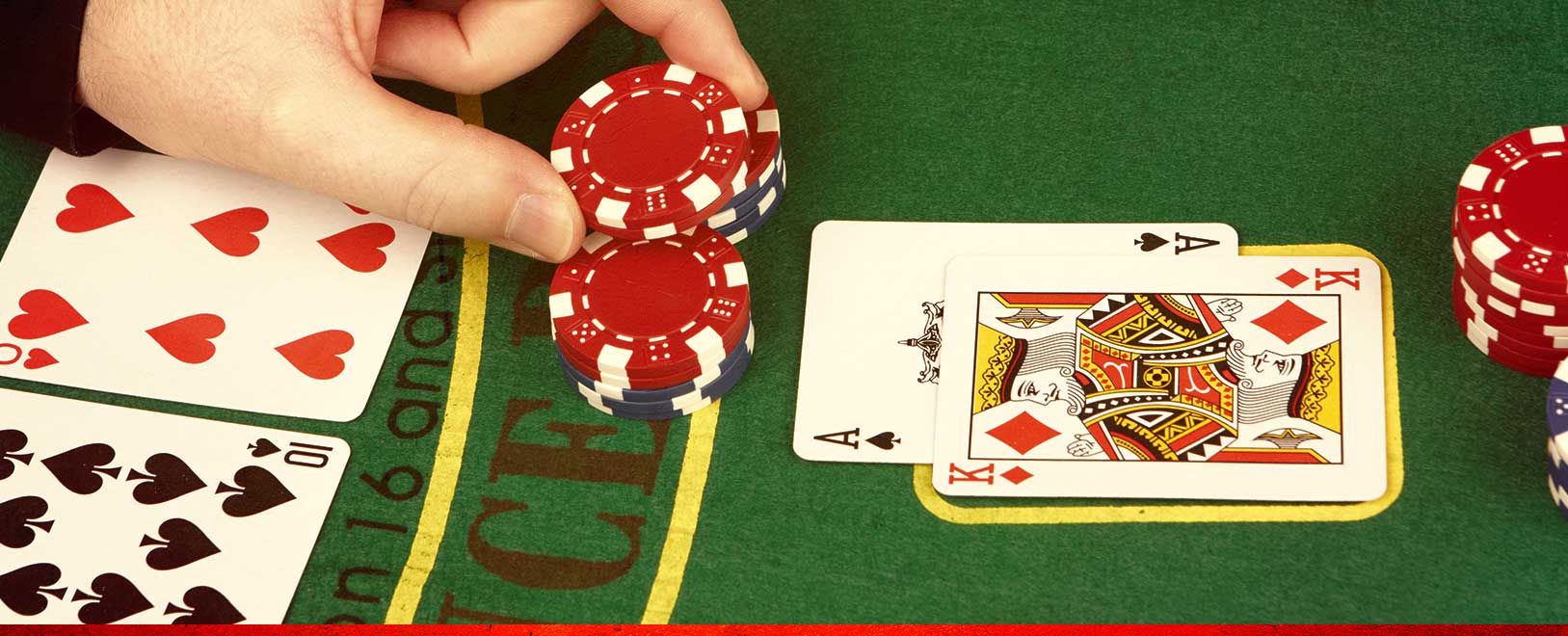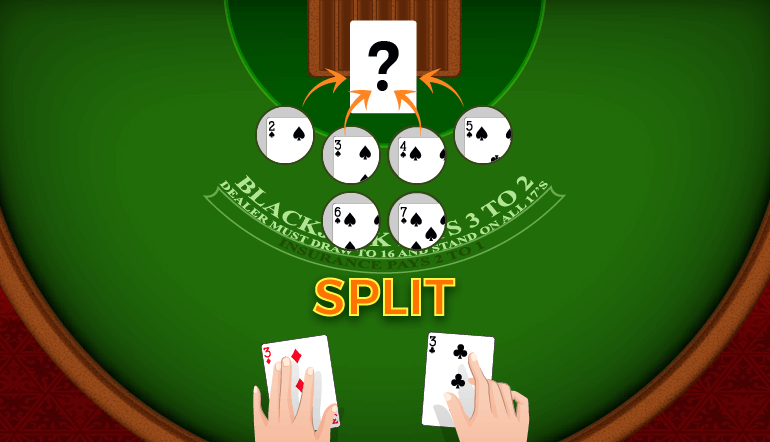Blackjack Double Down Odds



- Appendices
- Miscellaneous
- External Links
Introduction
Rule variations will have an effect on the player's expected return. The numbers below show the effect on the player's return under various rules and after taking into consideration proper basic strategy adjustments. These changes are relative to the following rules: eight decks, dealer stands on soft 17, player may double on anyfirst two cards, player can double after splitting, playermay split to 4 hands.
Blackjack Rule Variations
All basic blackjack strategy cards have information on when a player should double down and split their hand. This extra bet amounts will help players maximize returns and lower the house edge for the casino. Let’s first take a look at the hands a player should double down to maximize their return when playing blackjack using the basic strategy. Probability, Odds for a Blackjack or Natural 21 II. House Edge on Insurance Bet at Blackjack III. Calculate Double-Down Hands IV. Calculate Blackjack Pairs: Strict or Mixed Ten-Cards V. Free Blackjack Resources, Basic Strategy, Casino Gambling Systems 1.1. Calculate Probability (Odds) for a Blackjack or Natural 21 First capture by the WayBack Machine (web.archive.org) Sectember (Sect Month. Blackjack Double Down – A Numbers Game Firstly, however green you are to Blackjack, we can all agree that the highest number you can sensibly get is 21. Secondly, we’re out to beat the dealer, either by having the higher value hand, or watching them go bust. From there on in it’s a case of using statistics to your advantage.
| Rule | Effect |
|---|---|
| Blackjacks pay 2 to 1 | +2.27% |
| Triple down on any two cards | +1.64% |
| Five cardCharlie1 | +1.46% |
| Optional half win for 5-card Charlie9 | +0.77% |
| Suited blackjacks pay 2 to 1 | +0.57% |
| Player 21-points is automatic winner | +0.54% |
| Single deck | +0.48% |
| Early surrender against ace | +0.39% |
| Player 21 vs. dealer blackjack is a push | +0.35% |
| 5-card win pays 3-2 | +0.33% |
| Blackjack tie pays 3 to 2 | +0.32% |
| Six-card Charlie pays 3 to 2 | +0.31% |
| Early surrender against ten | +0.24% |
| 5-card (or more) 21 automatically pays 2 to 1 | +0.24% |
| Player may double on any number of cards | +0.23% |
| Ace and 10 after splitting aces is a blackjack (paying 3-2) | +0.21% |
| Player may draw to split aces | +0.19% |
| Double deck | +0.19% |
| Six card Charlie1 | +0.16% |
| Player may double, double for less, or stand after splitting aces | +0.15% |
| Tied blackjack pays 1-2 | +0.11% |
| Ace and 10 after splitting aces is a blackjack (paying 6-5) | +0.11% |
| Double Down Rescue | +0.10% |
| 6-card win pays 2-1 | +0.09% |
| Player may resplit aces | +0.08% |
| Player may double or stand after splitting aces | +0.08% |
| Late surrender against ten | +0.07% |
| Four decks | +0.06% |
| 7-card win pays 5-1 | +0.05% |
| 777 pays 3 to 1 automatically | +0.05% |
| Five decks | +0.03% |
| 777 pays 2 to 1 automatically | +0.03% |
| Six decks | +0.02% |
| Seven card Charlie1 | +0.01% |
| Late surrender against ace | +0.00% |
| Dealer must stop with six cards | +0.00% |
| Late surrender after splitting | +0.00% |
| Split to only 3 hands | -0.01% |
| No-peek: ace showing2 | -0.01% |
| BB+13 | -0.01% |
| Dealer secretly goes first5 | -0.02% |
| OBBO4 | -0.03% |
| European no hole card (splitting)7 | -0.03% |
| European no hole card (doubling)7 | -0.08% |
| Player may double on 9-11 only | -0.09% |
| No-peek: ten showing6 | -0.10% |
| Player may not resplit | -0.10% |
| European no hole card7 | -0.11% |
| Player may not double after splitting | -0.14% |
| Player may double on 10,11 only | -0.18% |
| Player may not split aces | -0.18% |
| Dealer hits on soft 17 | -0.22% |
| Blackkjack pays 7-5 | -0.45% |
| Player may not split | -0.57% |
| Red blackjack pays 2-1, Black blackjack pays 3-2, Mixed blackjack pays 1-1 | -0.57% |
| Blackjack pays 6-5 | -1.39% |
| Player may not double | -1.48% |
| Player loses 17 ties | -1.87% |
| Player may not double nor split | -1.91% |
| Blackjacks pay 1 to 1 | -2.27% |
| Player loses 17,18 ties | -3.58% |
| Player loses 17-19 ties | -5.30% |
| Dealer bust on 22 is a push8 | -6.91% |
| Player loses 17-20 ties | -8.38% |
| Player loses 17-21 ties | -8.86% |

Notes
- A 'Charlie' is an automatic winner. For example the five-card Charlie rule means the player automatically wins with 5 cards, as long as he didn't bust.
- Dealer does not peek for blackjack with an ace up. If dealer has a ace-up blackjack, player loses all bets made, including from doubling and splitting. A 10-up blackjack will be revealed immediately after peeking, and the player will lose only his original wager, except a blackjack tie will push.
- BB+1 refers to an Australian rule, in which the player will lose all busted bets, plus one unit, if the dealer gets a blackjack. For example, if the player splits 8's to three hands of a 20, (doubled) 19, and a busted hand, and the dealer get a blackjack, then the player will lose 2 units, one for the busted hand, and one from the remaining 3 units on the table. There is a great deal of confusion for the term for his rule, some sources calling it 'OBBO,' for Original and Busted Bets Only.
- OBBO stands for Original Bets and Busted Only. 'Original Bets' means each original bet per hand. So, if the player bet $5 and split to three hands, he would have three original bets of $5 each. As far as I know, the OBBO rule is confined to some parts of Australia and Malaysia. In the example above, the player would lose 3 units under this rule, one for the busted hand and two for the number of unbusted hands. The term is discussed in depth in the bookThe Pro's Guide to Spanish 21 and Australian Pontoon by Katarina Walker.
- This strange rule is actually followed in Pennsylvania, on Shufflemaster TMS-300 video multi-player blackjack games. State law prohibits one player taking the cards of another player. The way they implement this rule is to give every player, and the dealer, a separate shoe. The dealer plays out his hand first, secretly, and the results stored in memory. Then the cards used by the dealer are removed for each player shoe. When all players have finished acting, the game shows what cards the dealer drew already. According to Shufflemaster, the effect of this rule is 0.02% in favor of the dealer. Shufflemaster wishes to add this rule is part of a patent-pending technology.
- Dealer does not peek for blackjack with a 10 up. If dealer has a 10-up blackjack, player loses all bets made, including from doubling and splitting. An ace-up blackjack will be revealed immediately after peeking, and the player will lose only his original wager, except a blackjack tie will push.
- Dealer does not take a hole card, or never peeks at it if he does. If the dealer has a blackjack, then player loses all bets made, including from doubling and splitting, except a blackjack tie will push. The cost of this rule to the player is 0.08% when doubling, and 0.03% when splitting. This breakdown is important in the case of Galaxy casinos in Macau, where the player only loses the original bet when doubling, but everything when splitting, if the dealer gets a blackjack.
- The push on a dealer 22 rule is a legally protected rule. The rights belong to the owner of Blackjack Switch.
- This rule can be found at the Pharaoh's Palace in Macau. The player may invoke the rule before the dealer checks for blackjack. The effect shown is based on the dealer not taking a hole card.
Written by: Michael Shackleford
While most new blackjack players can quickly grasp the ideas of when to hit or stand, the decision between simply hitting and doubling down can trip up even more experienced players. Doubling down is one of the most powerful tools a player has to even up their odds against the casino, so knowing the appropriate times to double down (and when not to) is critical to any basic blackjack strategy.
In most forms of blackjack games, players are allowed to double down with any two card starting hand, and cannot double down once they have three or more cards. To double down, a player places a second bet of equal or lesser value to their original bet, for which they receive just one more card – after which they must stand.
When to Double Down – Hard Hands
Hard hands – those without an ace that still counts as 11 points – are much simpler to play in general, and this extends to double down play. Here’s a handy and easy-to-memorize guide for when to double down with a hard hand:
- Hands of 8 or less: Never double down with these hands. Sure, it’s very tempting to double down with an 8 against a dealer showing a 5 or 6, but you’ll do a little better by simply hitting even in those spots.
- Hands of 9: Here, doubling down starts to become a profitable play against the world dealer hands. If they dealer is showing a card in the range of 3-6, doubling down is the right move.
- Hands of 10: Now you’ll be doubling down a whole lot against most dealer cards. If the dealer is showing 9 or less, it’s time to double down.
- Hands of 11: This is the best starting hand for doubling down. Here, you’ll double down against a dealer that’s showing anything other than an ace.
- Hands of 12 or more: Don’t even think about it – doubling down is never the right move with a hard hand of 12 or more.
When to Double Down in Blackjack – Soft Hands

Soft hands are a bit trickier to figure out for most players, and the proper times to double down with them require a little more work to memorize. There are even some minor changes on what you should do depending on what the rules in your game say the dealer must do with a soft 17. Here’s a quick guide:
- Soft hands of 13 or 14: Double down only against a dealer 5 or 6; otherwise, simply hitting is the best play.
- Soft hands of 15 or 16: Double down against a dealer 4-6; against other hands, just hit.
- Soft hands of 17: Double down against a dealer showing anything in the range of 3-6; otherwise, hitting is the thing to do.
- Soft hands of 18: Here’s where it gets tricky! If you’re playing in a game where the dealer stands on a soft 17, you should double down if the dealer is showing 3-6, hit if the dealer is showing a 9 or higher, and stand against other hands. Against a dealer who must hit on soft 17, you should essentially do the same – except that you should also double against a 2, rather than standing.
- Soft hands of 19 or more: Always stand with these hands, with one exception; against a dealer who hits of soft 17, hit if the dealer is showing a 6.
Blackjack Odds Sheet
Why We Double Down in Blackjack
Blackjack Double Down Odds Genesis Open
Doubling down naturally puts the player at something of a disadvantage, since you give up the option of making further hits later in the hand. So why do we want to put more money on the line while lowering the odds that we’ll actually win the hand?
Blackjack Double Down Rule
Obviously, with most hands, this is a bad deal. However, when the player has a huge advantage against the house, lowering that advantage just slightly can be well worth it if we get to wager twice as much money, since that means our overall edge actually goes up. For example, if you make a $10 bet and have a 9 against a dealer 6, you can expect to make about $1.96 on average when you choose to hit. By doubling down, you can only expect to make about $1.58 on that first $10 – but you’ll also make the same amount on the second $10 you put down, pushing your total profits up to $3.17.